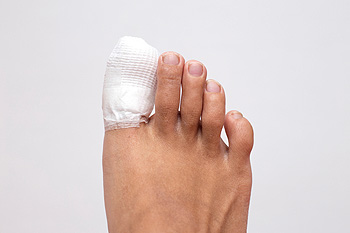1648 US Highway 130
North Brunswick, NJ 08902
Neuropathy is a common ailment among diabetic patients that can be connected to elevated blood sugar levels and can injure the nerves in the feet. Symptoms that are generally felt with neuropathy can include a numbness and tingling sensation in the feet, and it is often difficult to feel existing cuts and bruises. A loss of balance can also be a result of neuropathy. It is beneficial to treat this condition by implementing healthy daily eating habits, which may help to control high insulin levels. If you have numbness in your feet, it is suggested that you speak to a podiatrist who can properly diagnose neuropathy.
Neuropathy
Neuropathy can be a potentially serious condition, especially if it is left undiagnosed. If you have any concerns that you may be experiencing nerve loss in your feet, consult with Dr. Robert Fink from Brunswick Foot & Ankle Group. Our doctor will assess your condition and provide you with quality foot and ankle treatment for neuropathy.
What Is Neuropathy?
Neuropathy is a condition that leads to damage to the nerves in the body. Peripheral neuropathy, or neuropathy that affects your peripheral nervous system, usually occurs in the feet. Neuropathy can be triggered by a number of different causes. Such causes include diabetes, infections, cancers, disorders, and toxic substances.
Symptoms of Neuropathy Include:
Those with diabetes are at serious risk due to being unable to feel an ulcer on their feet. Diabetics usually also suffer from poor blood circulation. This can lead to the wound not healing, infections occurring, and the limb may have to be amputated.
Treatment
To treat neuropathy in the foot, podiatrists will first diagnose the cause of the neuropathy. Figuring out the underlying cause of the neuropathy will allow the podiatrist to prescribe the best treatment, whether it be caused by diabetes, toxic substance exposure, infection, etc. If the nerve has not died, then it’s possible that sensation may be able to return to the foot.
Pain medication may be issued for pain. Electrical nerve stimulation can be used to stimulate nerves. If the neuropathy is caused from pressure on the nerves, then surgery may be necessary.
If you have any questions, please feel free to contact our office located in North Brunswick, NJ . We offer the newest diagnostic and treatment technologies for all your foot care needs.
Read more about Neuropathy Broken toes and sprained toes are sometimes confused with each other. However, broken toes are far more serious because an untreated toe fracture can hinder your ability to walk, increase your risk of developing arthritis and be extremely painful. The characteristic symptoms of a broken toe that differentiate it from a sprain include localized throbbing pain at the fracture site, hearing a cracking sound at the time of injury, swelling, and bruising. If you suspect that you may have broken your toe, it is recommended that you visit a podiatrist. Broken toes are typically diagnosed using an X-ray and physical examination. The doctor may need to take multiple X-ray images to determine the location and extent of the break. For more information about broken toes, please consult with a podiatrist.
Broken toes and sprained toes are sometimes confused with each other. However, broken toes are far more serious because an untreated toe fracture can hinder your ability to walk, increase your risk of developing arthritis and be extremely painful. The characteristic symptoms of a broken toe that differentiate it from a sprain include localized throbbing pain at the fracture site, hearing a cracking sound at the time of injury, swelling, and bruising. If you suspect that you may have broken your toe, it is recommended that you visit a podiatrist. Broken toes are typically diagnosed using an X-ray and physical examination. The doctor may need to take multiple X-ray images to determine the location and extent of the break. For more information about broken toes, please consult with a podiatrist.
Broken toes may cause a lot of pain and should be treated as soon as possible. If you have any concerns about your feet, contact Dr. Robert Fink from Brunswick Foot & Ankle Group. Our doctor will treat your foot and ankle needs.
What Is a Broken Toe?
A broken toe occurs when one or more of the toe bones of the foot are broken after an injury. Injuries such as stubbing your toe or dropping a heavy object on it may cause a toe fracture.
Symptoms of a Broken Toe
Although the injured toe should be monitored daily, it is especially important to have a podiatrist look at your toe if you have severe symptoms. Some of these symptoms include worsening or new pain that is not relieved with medication, sores, redness, or open wounds near the toe.
If you have any questions, please feel free to contact our office located in North Brunswick, NJ . We offer the newest diagnostic and treatment technologies for all your foot care needs.
 Heel pain, which can cause severe discomfort, usually comes from one of two sources. The first type of heel pain is usually a result of overuse. This soreness results from too much impact on the foot, which can be caused by wearing shoes with too low of a heel, wearing down of the fat pad on the heel, or from a sudden increase in activity. The other source of heel pain is usually plantar fasciitis. This is typically caused by a biomechanical issue like flat feet, and occurs when the plantar fascia, the tissue connecting the heel to the toes, becomes inflamed. The first step to dealing with heel pain is providing a cushioning for the heel, such as an orthotic, to help absorb the shock from your movements. Persistent heel pain should be checked by a podiatrist, who may recommend other treatment options, such as anti-inflammatory medications or cortisone shots.
Heel pain, which can cause severe discomfort, usually comes from one of two sources. The first type of heel pain is usually a result of overuse. This soreness results from too much impact on the foot, which can be caused by wearing shoes with too low of a heel, wearing down of the fat pad on the heel, or from a sudden increase in activity. The other source of heel pain is usually plantar fasciitis. This is typically caused by a biomechanical issue like flat feet, and occurs when the plantar fascia, the tissue connecting the heel to the toes, becomes inflamed. The first step to dealing with heel pain is providing a cushioning for the heel, such as an orthotic, to help absorb the shock from your movements. Persistent heel pain should be checked by a podiatrist, who may recommend other treatment options, such as anti-inflammatory medications or cortisone shots.
Many people suffer from bouts of heel pain. For more information, contact Dr. Robert Fink of Brunswick Foot & Ankle Group. Our doctor can provide the care you need to keep you pain-free and on your feet.
Causes of Heel Pain
Heel pain is often associated with plantar fasciitis. The plantar fascia is a band of tissues that extends along the bottom of the foot. A rip or tear in this ligament can cause inflammation of the tissue.
Achilles tendonitis is another cause of heel pain. Inflammation of the Achilles tendon will cause pain from fractures and muscle tearing. Lack of flexibility is also another symptom.
Heel spurs are another cause of pain. When the tissues of the plantar fascia undergo a great deal of stress, it can lead to ligament separation from the heel bone, causing heel spurs.
Why Might Heel Pain Occur?
Treatments
Heel pain should be treated as soon as possible for immediate results. Keeping your feet in a stress-free environment will help. If you suffer from Achilles tendonitis or plantar fasciitis, applying ice will reduce the swelling. Stretching before an exercise like running will help the muscles. Using all these tips will help make heel pain a condition of the past.
If you have any questions please contact our office located in North Brunswick, NJ . We offer the newest diagnostic and treatment technologies for all your foot and ankle needs.
 Because of the complex system of bones, muscles, and joints in the feet, foot pain can be indicative of a variety of issues. Pain at the top of the foot can lead to issues when walking or standing still, and is most often caused by an overuse injury. An extensor tendonitis occurs when the tendons that run across the top of the foot become inflamed. Stress fractures can also lead to pain in this area. A midfoot sprain could cause the foot bones to hit against each other and inflame the small joints at the top of the foot. Peripheral neuropathy, which is the result of nerve damage, may also affect the top of the feet. If you are experiencing pain in the top of the foot make sure to consult with a podiatrist for proper diagnosis and treatment.
Because of the complex system of bones, muscles, and joints in the feet, foot pain can be indicative of a variety of issues. Pain at the top of the foot can lead to issues when walking or standing still, and is most often caused by an overuse injury. An extensor tendonitis occurs when the tendons that run across the top of the foot become inflamed. Stress fractures can also lead to pain in this area. A midfoot sprain could cause the foot bones to hit against each other and inflame the small joints at the top of the foot. Peripheral neuropathy, which is the result of nerve damage, may also affect the top of the feet. If you are experiencing pain in the top of the foot make sure to consult with a podiatrist for proper diagnosis and treatment.
Foot Pain
Foot pain can be extremely painful and debilitating. If you have a foot pain, consult with Dr. Robert Fink from Brunswick Foot & Ankle Group. Our doctor will assess your condition and provide you with quality foot and ankle treatment.
Causes
Foot pain is a very broad condition that could be caused by one or more ailments. The most common include:
Diagnosis
To figure out the cause of foot pain, podiatrists utilize several different methods. This can range from simple visual inspections and sensation tests to X-rays and MRI scans. Prior medical history, family medical history, and any recent physical traumatic events will all be taken into consideration for a proper diagnosis.
Treatment
Treatment depends upon the cause of the foot pain. Whether it is resting, staying off the foot, or having surgery; podiatrists have a number of treatment options available for foot pain.
If you have any questions, please feel free to contact our office located in North Brunswick, NJ . We offer the newest diagnostic and treatment technologies for all your foot care needs.